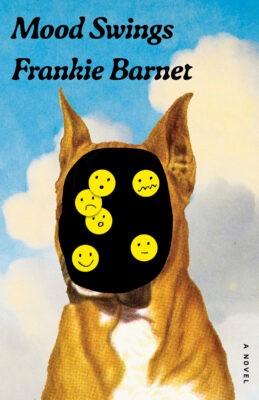What does it take to imagine the end of the world? If you ask contemporary writers, not much – with climate change and the rise of fascism, present-day dystopia is as much the stuff of journalism as it is science fiction. Frankie Barnet begins Mood Swings on this note, but then takes it even further. Writing about dystopia may not require much imagination in this day and age, but writing about a fail-safe solution to the apocalypse? That’s much more novel.

Mood Swings
Frankie Barnet
McClelland & Stewart
$24.95
paper
360pp
9780771010187
In a post-fauna world, roommates Jenlena and Daphne, along with Daphne’s boyfriend Jordan (who has been publicly “cancelled” by his underage ex-girlfriend), try not to succumb to one big fat existential crisis. Jenlena steals and sells plants as pets and dresses up as a dog for pay; Daphne and Jordan mourn the loss of their cat and grasp at what little control they have over their lives. With no animals, the climate crisis looms more than ever. Barnet leans into cli-fi clichés – the end of the world beginning with a pregnant protagonist, impending doom leading to confessions of guilt – only to break them, with an abortion five pages later and a culty podcast host calling out confessors: Apologizing is “pretty easy, really, when you’ve got no intention of changing. You know you don’t have to because you haven’t got the time.”
Enter billionaire Roderick Maeve and his promise of a miraculous time machine that will solve all problems. Roderick offers a glimmer of hope that cuts through the malaise of being a twenty-something-year-old in the twenty-first century. When Jenlena runs into him at the Queen Elizabeth Hotel on boulevard René-Lévesque, she leaves behind her furry Dalmatian suit (both literally and figuratively) to enter a world of celebrity sexting and NDA-worthy secrets.
While it may seem at first that Jenlena is the novel’s protagonist, a lot of the book is about and from the perspectives of those close to her – Jordan’s journey to and after getting “cancelled,” Daphne’s new lease on life once the time machine is announced, and Roderick’s worries over what he wants and what he can have. I was initially unsure of the POV shifts, with multiple ones occurring within some chapters, but as the novel progressed, I found the narrative tumult appealing. The chaos is easy to follow and aptly reflects the chaos of the novel’s and reader’s worlds – a discordant clash of thoughts and opinions that somehow remains enjoyable.
Barnet’s biting wit, while probably not for everyone, reflects the rising tide of postmodern millennial fiction, her style reminiscent of its quintessential women writers – Patricia Lockwood, Miranda July, Ottessa Moshfegh. This is most clearly seen in her dual wielding of sincerity and irony: an impassioned post about an abused sister ending with a string of cringey hashtags, or Roderick’s attempt at candour being interrupted by his assistant: “Sir, are you practising for a podcast?”
If I had one gripe with the novel, it would be that Barnet hits the nihilistic nail on the head a few too many times. The persistent mantra of “nothing matters,” first because the world is ending and then because it’s being saved, starts to feel repetitive. The moments of real connection are when she moves away from this: Daphne and Jenlena discussing their ever-changing future, their thoughts slipping “free from their cage. There was no better feeling than actually wanting tomorrow.” And, after all, is this not what matters most in a world doomed or redeemed? To want, to hope for, tomorrow to come.mRb






0 Comments